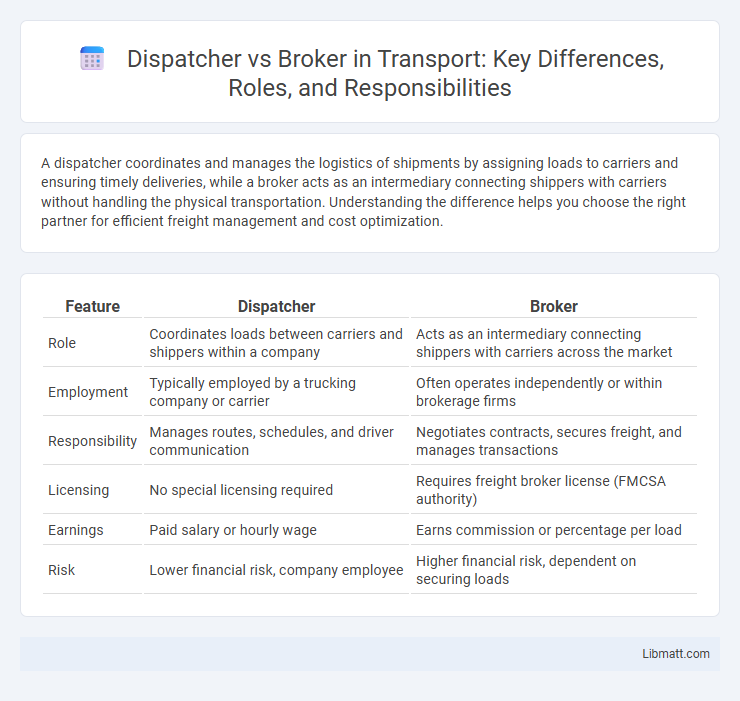A dispatcher coordinates and manages the logistics of shipments by assigning loads to carriers and ensuring timely deliveries, while a broker acts as an intermediary connecting shippers with carriers without handling the physical transportation. Understanding the difference helps you choose the right partner for efficient freight management and cost optimization.
Table of Comparison
| Feature | Dispatcher | Broker |
|---|---|---|
| Role | Coordinates loads between carriers and shippers within a company | Acts as an intermediary connecting shippers with carriers across the market |
| Employment | Typically employed by a trucking company or carrier | Often operates independently or within brokerage firms |
| Responsibility | Manages routes, schedules, and driver communication | Negotiates contracts, secures freight, and manages transactions |
| Licensing | No special licensing required | Requires freight broker license (FMCSA authority) |
| Earnings | Paid salary or hourly wage | Earns commission or percentage per load |
| Risk | Lower financial risk, company employee | Higher financial risk, dependent on securing loads |
Overview of Dispatchers and Brokers
Dispatchers coordinate and manage the routing and scheduling of services or shipments, ensuring timely and efficient delivery. Brokers act as intermediaries connecting clients with providers, negotiating terms and facilitating transactions without directly handling operations. Understanding the roles of dispatchers and brokers helps optimize your logistics and transportation strategies.
Key Definitions: Dispatcher vs Broker
A dispatcher coordinates the movement of vehicles, goods, or services by assigning tasks and managing schedules to ensure timely delivery or service execution. A broker acts as an intermediary between buyers and sellers, facilitating transactions and negotiating terms to connect parties within a marketplace. Your choice between a dispatcher and broker depends on whether you need operational management or transaction facilitation in your logistics or service process.
Core Responsibilities of a Dispatcher
A dispatcher primarily coordinates the timely allocation and routing of resources such as vehicles, personnel, or shipments, ensuring efficient communication between clients and service providers. Core responsibilities include managing schedules, tracking real-time progress, and resolving logistical issues to maintain seamless operations. They play a critical role in optimizing workflow, minimizing delays, and enhancing customer satisfaction through precise dispatching and monitoring.
Core Responsibilities of a Broker
A broker primarily facilitates transactions between buyers and sellers, ensuring the best possible deals while managing negotiations and contracts. Brokers assess market trends, provide expert advice, and maintain compliance with legal and regulatory requirements to protect client interests. They also coordinate communication, handle documentation, and oversee the closing process to guarantee smooth and efficient trades.
Differences in Legal Requirements
Dispatchers typically operate under less stringent legal requirements compared to brokers, often only requiring basic registration depending on the jurisdiction. Brokers must comply with comprehensive regulatory frameworks, including obtaining specific licenses, maintaining surety bonds, and adhering to strict financial and operational standards. These legal distinctions ensure brokers have formal authority to arrange transportation contracts, whereas dispatchers primarily coordinate logistics without contractual obligations.
How Dispatchers and Brokers Earn Income
Dispatchers earn income by charging a percentage or flat fee for coordinating logistics and communication between drivers and clients, often taking 3-5% of the load payment. Brokers generate revenue through brokerage fees, typically 10-20%, by negotiating freight contracts and arranging transportation between shippers and carriers. Both roles rely on efficient matchmaking and contract management to maximize profit margins in the freight industry.
Pros and Cons: Dispatcher vs Broker
Dispatchers provide direct communication and immediate assignment of tasks, enhancing efficiency but may require more hands-on management, which can increase operational complexity. Brokers offer a broader network for load matching and negotiation flexibility, improving access to opportunities but often charge higher fees and reduce direct control over logistics. Your choice depends on balancing cost-effectiveness and control against service reach and convenience.
Ideal Scenarios for Using Each Role
Dispatchers are ideal for managing real-time logistics and optimizing immediate route assignments in industries such as transportation and emergency services, where rapid decision-making and direct communication with drivers or responders are critical. Brokers excel in scenarios involving complex negotiations and long-term contracts, frequently serving as intermediaries in markets like freight shipping and insurance, where matching client needs with multiple service providers ensures flexibility and cost-effectiveness. Choosing between dispatcher and broker depends on the operational focus: dynamic, on-the-ground control favors dispatchers, while strategic market facilitation aligns with brokers.
Industry Perceptions and Common Misconceptions
Dispatchers and brokers often face confusion in logistics, as industry perceptions blur their distinct roles; dispatchers manage driver schedules and compliance, while brokers arrange freight contracts between shippers and carriers. A common misconception is that dispatchers hold the same legal authority as brokers, though brokers require specific licensing and bond to operate. Understanding these differences helps your logistics operations avoid compliance issues and improve efficiency.
Choosing the Right Service for Your Freight Needs
When selecting between a dispatcher and a broker for your freight needs, consider that dispatchers primarily work directly with truck drivers to organize routes and schedules, offering personalized management that enhances operational efficiency. Brokers act as intermediaries between shippers and carriers, providing broader market access and negotiating freight contracts to secure competitive rates. Understanding your specific requirements--such as whether you need hands-on route coordination or market-wide freight matching--will help you choose the service that best optimizes your logistics and ensures timely deliveries.
dispatcher vs broker Infographic

 libmatt.com
libmatt.com